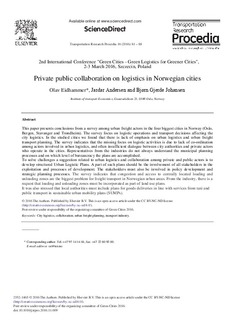Private public collaboration on logistics in Norwegian cities
Journal article, Peer reviewed
Published version
Date
2016-11-23Metadata
Show full item recordCollections
Abstract
This paper presents conclusions from a survey among urban freight actors in the four biggest cities in Norway (Oslo, Bergen, Stavanger and Trondheim). The survey focus on logistic operations and transport decisions affecting the city logistics. In the studied cities we found that there is lack of emphasis on urban logistics and urban freight transport planning. The survey indicates that the missing focus on logistic activities is due to lack of co-ordination among actors involved in urban logistics, and often insufficient dialogue between city authorities and private actors who operate in the cities. Representatives from the industries do not always understand the municipal planning processes and on which level of bureaucracy the plans are accomplished.
To solve challenges a suggestion related to urban logistics and collaboration among private and public actors is to develop structured Urban Logistic Plans. A part of such plans should be the involvement of all stakeholders in the exploitation and processes of development. The stakeholders must also be involved in policy development and strategic planning processes. The survey indicates that congestion and access to centrally located loading and unloading zones are the biggest problem for freight transport in Norwegian urban areas. From the industry, there is a request that loading and unloading zones must be incorporated as part of land use plans.
It was also stressed that local authorities must include plans for goods deliveries in line with services from taxi and public transport in sustainable urban mobility plans (SUMPs).

